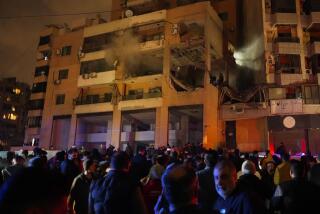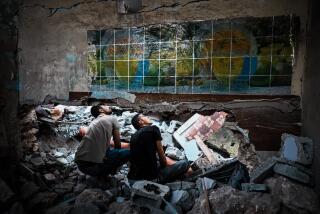A slain Iraqi police chief’s family awaits justice
- Share via
HILLAH, IRAQ — In the darkened living room of a house surrounded by concrete barriers, Safaa Mamouri wipes his eyes and reproaches himself for how little he resembles his dead brother, a man even his enemies admired.
“Qais was fearless. I’m not like him,” he says. “From the first threat, I quit.”
Maj. Gen. Qais Hamza Mamouri presided over security here in Babil province at a dangerous time, when the country’s sectarian war raged. His detractors accused him of being a law unto himself, but his supporters say the secular Shiite Muslim steered a middle course between Sunni Arabs and the religious Shiite parties in power.
He paid the price: A little more than a year ago, he was killed when a high-powered bomb tore apart his armored SUV. Police rounded up four men suspected of planting the explosive, but his brother believes they were hired hands.
He mulls over his words and opts for caution, knowing his brother is not here to shield him from the powerful.
“Qais would not tolerate any party that interfered in his work,” Mamouri says. “That was one of the reasons he was killed.”
Mamouri remembers sitting in court in September hoping to see the four men accused of planting the bomb testify. Instead, the presiding judge asked to be removed from the case, citing political pressure on the court. The judge also cited allegations that the detainees had been tortured to extract confessions.
“The political sides intimidated the judge and made him leave the case,” Mamouri said. “Maybe it was a political party that has power in the government and intimidated the judge, or a side that had militias.”
After the judge stepped down, the case was assigned to Baghdad’s criminal court. A date was finally set, but when police failed to bring the defendants to court Sunday, the trial was postponed once more.
The aftermath of the assassination reveals much about the precarious nature of justice in Iraq; more than five years after the ouster of Saddam Hussein, there hasn’t been a single conviction of anyone from a major government party for human rights abuses committed during the civil war.
The trial could provide a measure of how far the government is willing to go in investigating cases in which figures in the ruling Iraqi parties may have committed crimes.
Mamouri isn’t optimistic.
“As long as these people in power are governing Iraq,” he says, “I don’t think we can witness a fair trial.”
U.S. officials have commended the judge’s decision to protest political pressure. “His request to transfer the matter annoyed certain parts of the Babil political establishment and could have put [the judge’s] personal safety into jeopardy,” said a U.S. diplomat, who was not authorized to speak on the record.
Qais Mamouri antagonized the biggest players in Shiite national politics, including the Supreme Islamic Iraqi Council, Prime Minister Nouri Maliki’s Islamic Dawa Party and cleric Muqtada Sadr’s Mahdi Army militia. About a month before his death, he challenged the SIIC and Dawa by seizing weapons in a raid on their offices in a district of northern Babil.
In the dead man’s home, his widow and brother sit in the brown living room, decorated with pictures of the weathered general and a framed Koranic verse; a police checkpoint stands guard outside. Gunmen fired on the house in September after the judge excused himself from the trial.
Safaa Mamouri has decided to run in provincial elections this month. Detractors think he is simply using his brother’s death to his own advantage; he presents it as a quixotic step to avenge his sibling.
“The hostile people who killed him expected he would be finished,” he says, “but our [slate] decided to complete his mission.”
Mamouri talks about his brother’s past. A MiG pilot, he was forced out of the air force in 1991 when Hussein’s security forces executed their father on suspicion of belonging to a religious party. He spent the next decade working various jobs, including selling cars, and then in 2003, after Hussein was ousted, the people of Hillah nominated him to be police chief.
Stories of bravery quickly followed him. He survived a bombing of his house. As soon as he and his wife were dug out of the rubble, he gathered his men to raid the area he suspected the attackers came from.
He didn’t hesitate to go after the powerful and had even been threatened with dismissal by the SIIC-controlled provincial council. The Americans praised him.
“He wanted to implement the law in the province, not the law of parties or militias. These parties have their own ideas and vision about law. They wanted their views to prevail; he didn’t agree with that,” Mamouri says.
Talking about her husband’s death, his widow, a round-faced woman bundled in a black abaya, grows impatient with her brother-in-law’s caution and starts to speak more harshly about parties in the government. Mamouri tries to quiet her.
“Qais taught us not to have fear and to trust fate,” she says. “He didn’t know the meaning of fear.”
--
More to Read
Sign up for Essential California
The most important California stories and recommendations in your inbox every morning.
You may occasionally receive promotional content from the Los Angeles Times.










